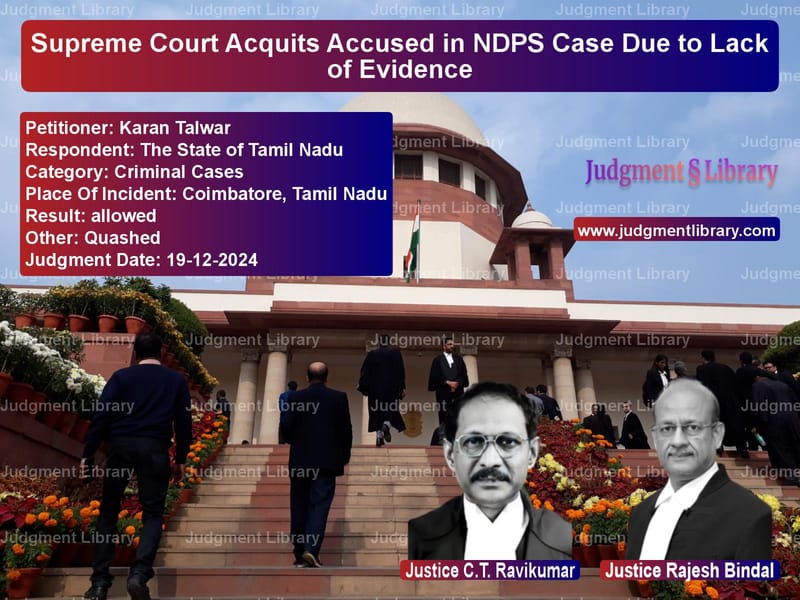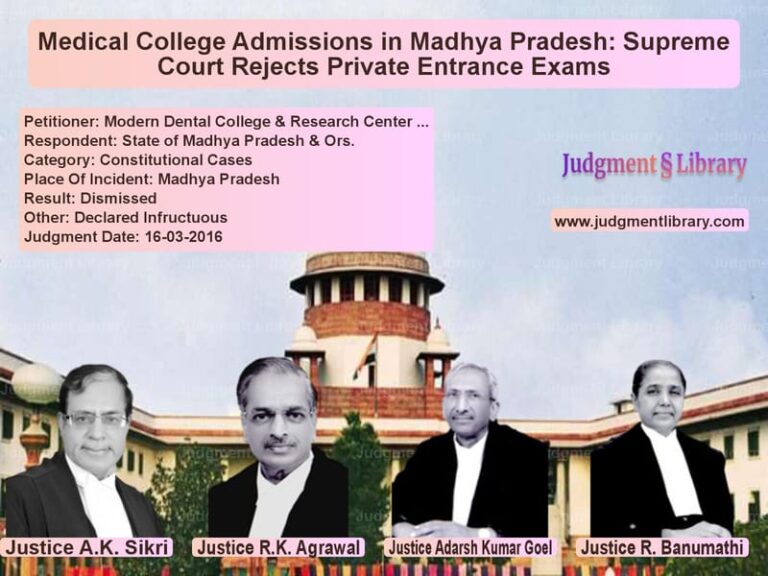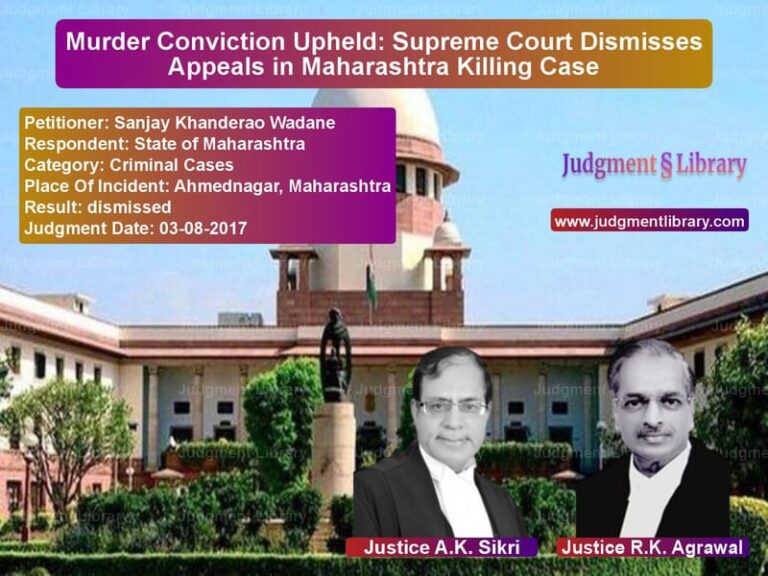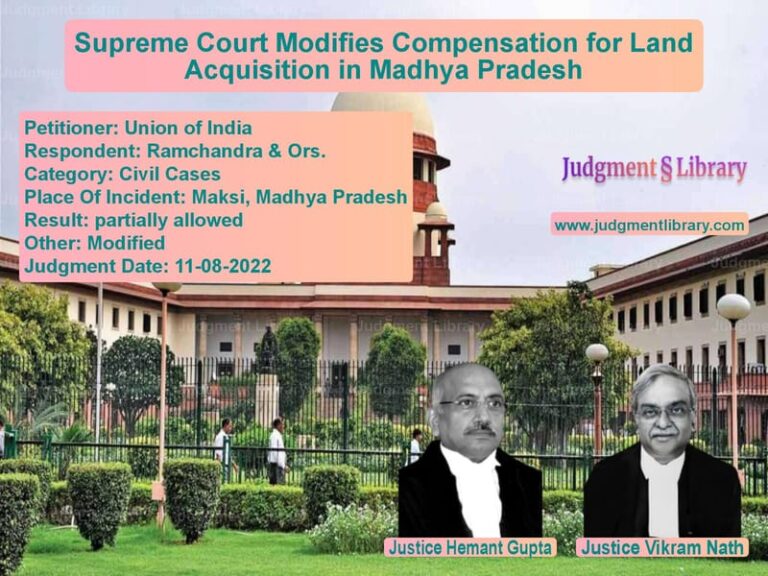Supreme Court Acquits Accused in NDPS Case Due to Lack of Evidence
The Supreme Court of India, in the case of Karan Talwar vs. The State of Tamil Nadu, addressed crucial questions regarding wrongful implication under the Narcotic Drugs and Psychotropic Substances Act, 1985 (NDPS Act). The judgment, delivered by C.T. Ravikumar and Rajesh Bindal, emphasized the need for concrete evidence before making an accused stand trial and highlighted the inadmissibility of co-accused confessions in such cases.
Background of the Case
The case originated from an event at a resort in Coimbatore, Tamil Nadu, where a music fest was allegedly organized without government approval. The prosecution alleged that narcotics were distributed and consumed at the event. An FIR (No. 129/2019) was registered on May 4, 2019, implicating multiple accused, including the appellant, Karan Talwar (Accused No. 13).
The allegations stated that:
- The event was arranged by Accused No. 1 and managed by Accused Nos. 2, 3, and 15.
- Accused Nos. 11 and 12 facilitated the supply of narcotics.
- Accused No. 1 allegedly procured 200 grams of cannabis.
- Some accused, including the appellant, consumed drugs at the party.
The final report charged the appellant under Section 27(b) of the NDPS Act, which pertains to the consumption of narcotic substances.
Legal Arguments
Petitioner’s Arguments
The appellant, through his legal counsel, argued:
- The only evidence against him was the confessional statement of a co-accused, which is inadmissible under Section 25 of the Indian Evidence Act, 1872.
- No drugs were recovered from him, and he was not subjected to any medical examination.
- The trial court and the High Court had wrongly rejected his discharge application, making him face an unnecessary trial.
- Forcing him to undergo trial without any substantial evidence would violate his fundamental rights.
Respondent’s Arguments
The prosecution contended:
- There was sufficient material to frame a charge under Section 27(b) of the NDPS Act.
- Confessional statements of co-accused, even if inadmissible as sole evidence, could still contribute to a prima facie case.
- The presence of the accused at the event where drugs were consumed was enough to warrant a trial.
Supreme Court’s Analysis and Findings
Principles of Discharge under CrPC
The Supreme Court relied on previous rulings to determine the correct application of Section 227 of the Code of Criminal Procedure (CrPC), which deals with the discharge of accused persons:
“If, upon consideration of the record of the case and the documents submitted therewith, and after hearing the submissions of the accused and the prosecution, the Judge considers that there is not sufficient ground for proceeding against the accused, he shall discharge the accused.”
Referring to P. Vijayan v. State of Kerala (2010) 2 SCC 398, the Court reiterated:
“The Judge is not a mere post office to frame the charge at the behest of the prosecution but has to exercise judicial discretion in determining whether a case for trial exists.”
Co-Accused’s Confession as Sole Evidence
The Court observed that the only evidence against the appellant was a confessional statement made by another accused. Relying on Suresh Budharmal Kalani v. State of Maharashtra (1998) 7 SCC 337, it held:
“A co-accused’s confession containing incriminating matter against another accused would not by itself suffice to frame a charge.”
Additionally, the Court pointed out that no recovery of contraband was made from the appellant, nor was he subjected to any medical examination to prove drug consumption.
Prosecution’s Weak Evidence
The Court strongly criticized the investigating agency’s reliance on a police witness who claimed that he could “smell” the accused to confirm drug consumption:
“The less said the better. Even if such evidence was tendered, it would not help the prosecution in any way.”
Impact of Forcing a Trial Without Evidence
The Supreme Court noted that standing trial itself is an ordeal and should not be imposed on individuals without substantial evidence. Citing Dipakbhai Jagadishchandra Patel v. State of Gujarat (2019) 16 SCC 547, the Court emphasized:
“All that is required is for the court to be satisfied that with the materials available, a case is made out for the accused to stand trial. A strong suspicion suffices, but a strong suspicion must be founded on some material.”
Since there was no admissible evidence against the appellant, the Court held that he should not be forced to face trial.
Final Verdict
The Supreme Court allowed the appeal and:
- Set aside the High Court’s order rejecting the discharge plea.
- Quashed the proceedings against the appellant in CC No. 43 of 2020.
- Held that co-accused confessions alone cannot justify prosecution.
- Reaffirmed that no person should face trial without concrete evidence.
Impact of the Judgment
This ruling reinforces the principle that mere presence at a crime scene does not warrant prosecution. It also highlights:
- The importance of proper investigative procedures in NDPS cases.
- The inadmissibility of co-accused confessions as sole evidence.
- The necessity for trial courts to scrutinize evidence before framing charges.
By ensuring that individuals are not forced into wrongful trials, the judgment upholds the core tenets of justice and protects fundamental rights.
Petitioner Name: Karan Talwar.Respondent Name: The State of Tamil Nadu.Judgment By: Justice C.T. Ravikumar, Justice Rajesh Bindal.Place Of Incident: Coimbatore, Tamil Nadu.Judgment Date: 19-12-2024.
Don’t miss out on the full details! Download the complete judgment in PDF format below and gain valuable insights instantly!
Download Judgment: karan-talwar-vs-the-state-of-tamil-n-supreme-court-of-india-judgment-dated-19-12-2024.pdf
Directly Download Judgment: Directly download this Judgment
See all petitions in Drug Possession Cases
See all petitions in Bail and Anticipatory Bail
See all petitions in Custodial Deaths and Police Misconduct
See all petitions in Attempt to Murder Cases
See all petitions in Judgment by C.T. Ravikumar
See all petitions in Judgment by Rajesh Bindal
See all petitions in allowed
See all petitions in Quashed
See all petitions in supreme court of India judgments December 2024
See all petitions in 2024 judgments
See all posts in Criminal Cases Category
See all allowed petitions in Criminal Cases Category
See all Dismissed petitions in Criminal Cases Category
See all partially allowed petitions in Criminal Cases Category







